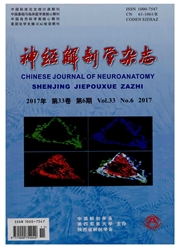

 中文摘要:
中文摘要:
目的:在体外探讨前列腺环素E2对神经干细胞增殖分化的影响及可能的分子机制。方法:原代培养小鼠胚胎神经干细胞。分为溶剂对照组;100nmol/L、1μmol/L前列腺环素E2处理组;1μmol/L前列腺环素E2加15μmol/LXAV939处理组。上述各组细胞在无血清增殖培养基中培养两天后,行BrdU、PY489染色,观察神经干细胞的增殖及Wnt信号的激活;在含2%胎牛血清的分化培养基中培养四天后,行Tuj/GFAP,CNPase染色,观察神经干细胞的分化。结果:100nmol/L,1μmol/L前列腺环素E2可分别使神经干细胞的增殖增加约86%和195%,及其向神经元方向的分化增加约85%和257%,抑制向星形胶质细胞方向的分化,但不影响向少突胶质细胞方向的分化。100nmol/L,1μmol/L前列腺环素E2可使核型p—catenin阳性细胞的百分率分别增加约31%和91%。15μmol/LXAV939可显著降低1μmol/L前列腺环素E2诱导的神经干细胞增殖及其向神经元方向的分化。结论:前列腺环素E2可在体外通过Wnt/β-catenin信号促进神经干细胞增殖,并诱导其向神经元方向分化。
 英文摘要:
英文摘要:
Objective: To assess the effects of prostaglandin E2 (PGE2) on the proliferation and differentiation of neu- ral stem cells, and the corresponding mechanisms in vitro. Methods: Primary neural stem cells were treated with ( 1 ) ve- hicle control; (2) 100 nmol/L, 1 μmol/L PGE2; (3) 1 μmol/L PGE2 plus 15 μmol/L XAV939. After 2d's culture in proliferative medi μmol/L, immunostaining of BrdU and PY489 were performed to assess cell proliferation and Wnt signa- ling activation. After 4d's culture in the differentiating medium, immunostaining of GFAP, Tujl and CNPase were con- ducted to evaluate the differentiation of neural stem cells. Results: 100 nmol/L and 1 μmol/L PGE2 significantly pro- mote the proliferation of neural stem cells by about 86% and 195%, and neuronal differentiation by 85% and 257%, suppress the astrocytic differentiation of neural stem cells, but not the generation of oligodendrocyte. 100 nmol/L and 1 μmol/L PGE2 significantly increase the percentages of nuclear β-catenin by 31% and 91%. Wnt signaling inhibitor, XAV939 can significantly decrease the PGE2-induced proliferation and neuronal differentiation of neural stem cells. Con- clusion: PGE2 can stimulate neurogenesis through Wnt/β-catenin signaling in vitro.
 同期刊论文项目
同期刊论文项目
 同项目期刊论文
同项目期刊论文
 期刊信息
期刊信息
